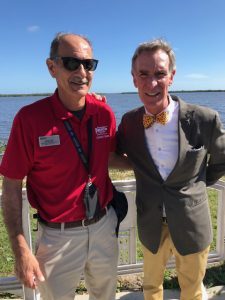Learn more about degree programs at American Public University. |
By Susan Hoffman
Contributor, Online Learning Tips
Do you have any plans for Earth Day 2018? The Earth Day Network has multiple campaigns in which you can get involved.
Earth Day is coming up on Sunday, April 22. Since the origin of the modern environmental movement in the 1970s, Earth Day has been a way to raise awareness of pollution issues. This day has also inspired citizens to take direct action to improve the environment.
Citizen science is also a useful way to get involved in environmental projects. APUS environmental science faculty member Charlie Venuto recently explained the concept of citizen science and how people can participate in environmental projects.
How would you define citizen science?
Citizen science involves non-professional citizens who volunteer to participate in scientific research projects. An example would be the Christmas Bird Count, a program developed by the National Audubon Society. The Christmas Bird Count is a bird census which has been held every year since 1900.
Thousands of people in the U.S., Canada and other countries take part in this census, which is held for one day between mid-December and early January. The data they collect is verified and used for scientific research.
Other citizen science projects include compiling population data on other species such as sea turtles, amphibians, plants and whales. Some projects focus on gathering information on invasive species, which can be useful in developing programs to remove these species.
One of my favorite projects is the NAS Back Yard Bird Count. On one Saturday a year, you can just look out your window and count the birds!
How does citizen science aid scientific research?
Citizen science is useful for many organizations and universities. It provides data that can help us to understand trends and make future predictions about environmental issues.
Using non-professionals, how do you ensure that citizen science is conducted properly?
The data collected by our volunteers is carefully monitored and compiled to ensure accuracy. We have standards in regard to what we expect volunteers to find and we are self-policing. People want to do the best they can to aid scientific research.
Our volunteers also take note of unexpected sights. They are required to document what they see through photographs; this data and the images then go up the chain to scientific researchers.
What types of environmental projects can people get involved in?
The best way to find environmental projects is to check within your community. Many cities and towns have trash cleanup projects called “trash bashes.” These projects provide immediate gratification because you see the tangible results of your work. They’re easy and low-tech.
You can also check with state and local parks to see what work they need. Here in Florida, for example, we have a poisonous, invasive species of Brazilian pepper. It grows aggressively, interferes with bird populations and blocks other plants from sunlight. We’ve had to get it out of state parks, national parks and nature preserves. It’s an ongoing battle.
Another project we’ve done in Florida involves oyster repopulation by creating oyster-friendly habitats. Volunteers drill holes in oyster shells, tie them to aquaculture-grade mesh mats, transport them to chosen sites and place the mats in the water near reefs. The mats are held down by concrete doughnuts. These shells attract oyster larvae, which grow into oysters.

You recently had the opportunity to meet Dr. Bill Nye during the SpaceX Falcon Heavy shuttle launch in February. Do you have any quotes from him?
I met Bill Nye at the lagoon viewing area near the launch site and had a picture taken with him. Unfortunately, we didn’t have much time to talk because he was kept busy by other people, but I did get the chance to tell him that I enjoyed his book.
Are you an APU or AMU student? Join our Save the Earth Club whose purpose is to spread general awareness of environmental issues and develop service-oriented plans to get the university more involved with the environment. For more information or to join this club, contact studentaffairs@apus.edu.
Learn more about degree programs at American Public University. |

Comments are closed.